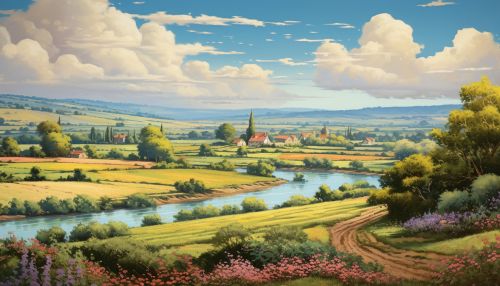France
Geography
France, officially known as the French Republic (République française), is located in Western Europe. It is geographically diverse, with a variety of landscapes including coastal regions, mountain ranges, and rural farmland. The country is bordered by six countries: Belgium and Luxembourg to the north, Germany and Switzerland to the east, and Italy and Spain to the south. It also shares maritime borders with the United Kingdom.


The country's total land area is approximately 551,695 square kilometers, making it the third-largest country in Europe and the 43rd largest in the world. France's terrain is mostly flat plains or gently rolling hills in the north and west, while the rest is mountainous, especially the Pyrenees in the south and the Alps in the east, the latter of which contains the highest point, Mont Blanc, at 4,810 meters above sea level.
France is also home to several major rivers, including the Seine, the Loire, the Garonne, and the Rhone, which provide vital water for agriculture, industry, and domestic use. The country's climate varies from temperate in the north to Mediterranean in the south, making it a favorable destination for a variety of agricultural activities.
History
The history of France is deep and varied, dating back to the Neolithic era when early humans settled in the fertile valleys of the Seine and Loire rivers. The country's name comes from the Franks, a Germanic tribe that invaded the region in the 5th century.
The Middle Ages saw the establishment of the Kingdom of France, which emerged as a major European power under the rule of King Louis XIV in the 17th century. The French Revolution, which started in 1789, marked a period of radical social and political upheaval in France that had a lasting impact on French history and more broadly on the world.
The 19th century was marked by the expansion of French colonial empire and the consolidation of its political structures. The 20th century, however, was dominated by the two World Wars, in which France played a major role.
The post-war period was marked by economic growth known as the "Trente Glorieuses" and the country's influence grew, particularly in the areas of technology, science, and culture. Today, France is considered a global power with significant influence on the world stage.
Politics
France is a semi-presidential republic with a head of state (the president) and a head of government (the prime minister). The political system is characterized by a separation of powers, with executive, legislative, and judicial branches.
The President of the French Republic is elected to a five-year term by direct universal suffrage. The president appoints the prime minister, who forms a government. The French parliament is a bicameral legislature comprising the National Assembly (the lower house) and the Senate (the upper house).
France is a founding member of the United Nations and one of the five permanent members of its Security Council. It is also a member of other international institutions, including the European Union, the Organisation for Economic Co-operation and Development (OECD), and the North Atlantic Treaty Organization (NATO).
Economy
France has a diverse and developed economy, the seventh-largest in the world by nominal GDP. It is a member of the Organisation for Economic Co-operation and Development (OECD), the Eurozone, and the Organisation internationale de la Francophonie.
The French economy is characterized by a mix of private and public enterprises. Key sectors include manufacturing, services, agriculture, and tourism. France is the world's largest wine producer and the second-largest exporter of agricultural products after the United States.
Despite its strengths, the French economy faces several challenges, including high unemployment rates, a complex regulatory environment, and a high public debt level.
Culture
French culture is renowned for its influence on literature, art, cinema, fashion, and cuisine. France has been a cultural hub for centuries, and French is the second most studied language in the world.
French literature has a long and rich history, with notable authors including Victor Hugo, Marcel Proust, and Albert Camus. France is also known for its contributions to art, with famous French artists including Claude Monet, Pierre-Auguste Renoir, and Paul Cézanne.
French cuisine is renowned worldwide. Known for its quality and diversity, French cuisine ranges from the refined dishes of haute cuisine to the hearty fare of regional bistro cooking.
